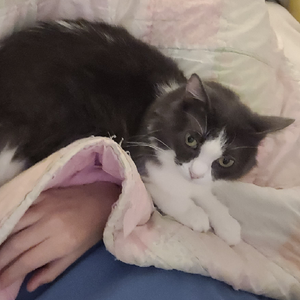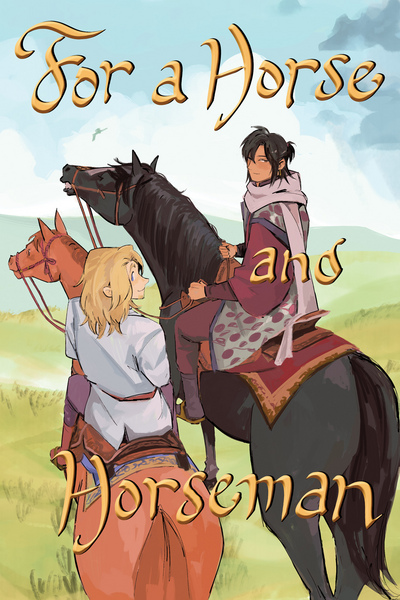FOR A HORSE AND HORSEMAN
Osmund was a stupid, meek, bumbling, ridiculous, worthless prince.
At least, that was what his royal father was fond of saying, and anything proclaimed by His Majesty Valen Haldebard in his booming, kingly voice was truth. Osmund was stupid and meek and worthless. He knew that.
But even so: he was a prince of Valcrest. For all else that he was, he was still the firstborn son of the Haldebard family, heir to an ancient and noble line.
How did he end up here—dirty, reeking, his tattered clothes caked in dirt and manure and foreign soil, scavenging for the food in his belly?
And was it maybe somehow just a dream he could wake up from?!
Unfortunately, this nightmare was real. And he knew it, because no matter how many times he pinched himself here on the floor of the hovel he called home, he awoke not in a soft bed in the castle, but on the hard ground with his cheek in the dirt. Sometimes to a street cat attempting to raid his meager belongings. Like right now.
“Stop, you…wicked creature.” His words slurred with exhaustion as he kicked out a foot in the cat’s general direction. The animal, perhaps seeing how stupid and meek and bumbling he was (and how he had no intention of actually landing a hit), ignored him, and he couldn’t be moved to protest further.
Pulling his body upright, he watched his feline visitor instead. Wiry though it was, the cat moved with confidence, every bit the seasoned urbanite that Osmund, the spoiled palace brat, wasn’t. Its body language seemed to say, “I belong here and you don’t”, or maybe, “I deserve to eat your food because you’re too meek to defend it from me. Maybe you should just die?” and that seemed a little mean-spirited, honestly. But he couldn’t argue.
Just like the stray, he was hungry and thin and wretched. The difference between the two was that Osmund hadn’t accepted his lot yet. “I want to go home,” he whimpered to the cold unfeeling universe, and when the creature finally made off with the contents of his bag—nothing more than the crumbs from last night’s find, thief pilfering from thief—he felt the last of his resolve threatening to slip away with it.
If this was freedom, perhaps freedom didn’t suit him. Osmund could not live on wits and wiles like a cat reared on the streets. He was a domestic creature. Survival was the willingness to call another man “master”. Yet even now, something within him rebelled.
He knew what awaited him if Lord Pravin found him: regular meals. Baths. A soft bed.
And the crown that would be his collar.
The family on whose hospitality he was encroaching were local Meskato who’d taken pity on his frankly, pitiful state and let him do odd jobs in return for the scraps from their table and the use of an old shed in their courtyard. During the day, he dragged his feet onto the sloping streets of Şebyan and hunted for work. This was difficult because his command of the Meskato language was, to use a phrase his old palace tutor was fond of, “an utter disgrace”.
“Work! Need work!” Osmund called as he walked, using the smattering of words he remembered from his lessons, as well as the few he’d picked up since arriving here. “Clean houses, I clean! Horses, clean horses, clean houses!”
He wandered around like this until the sun was high. Even the stink of offal from the butchers’ market twisted his aching stomach. He’d gone twenty-three years not knowing what it was like to be hungry, really hungry. Images of longing flooded his memory: the irate castle cook and the servants who dutifully ignored him as they brought him his breakfast. The heaps of bread and cheese and meat that had been a staple of every meal, no matter the occasion. Pastries. Pies. Tarts. Jams!
But most of all, he missed—
No! He couldn’t think about them. Osmund moved his body forward and stared ahead past the crowds of people gathering their daily goods and gossip. He could only carry on if he didn’t think about…
Alas. Too late.
With every little piece of his miserable soul, Prince Osmund Haldebard missed his girls. His sweet, darling girls.
Bella, with her rippling smoky mane and eyes like a pool of reflected twilight. Minerva, a palomino he’d raised from a foal, who could ford a river in a single jump. Callista, roan red and proudest of the bunch, with a strut that said she knew she was a prince’s steed. An empty stomach he could endure, but the hole in his heart was agony. They were on the other side of the sea without their princeling, possibly as hungry as he was. Or, very possibly, dead.
“Need work,” Osmund continued croaking at anyone who would listen, nearly not noticing the local Meskato woman until she stood directly blocking his path.
“Hello, ███,” she greeted, smiling. “Have you ███ work today?”
He only understood every other word, as per usual, but the rest could be pieced together well enough. “N-no work today,” Osmund admitted, averting his eyes.
The woman reached into her basket and, to his amazement, offered him a firm, palm-sized plum she must’ve just purchased at the market. His mouth was already swimming with a phantom sweetness, rich and overpowering. “Take it!” she urged, still tempting him with this treasure.
No. He couldn’t. He was an able young man, and noble-born besides; he wasn’t deserving of charity. Was it just the language barrier keeping his tongue so stiff and useless in his mouth?
She pressed the fruit into his palm and closed his fingers around it, unburdening him of the choice. “Thank you,” he mumbled, the only civilized action left in his power, inadequate though it was. The world grew blurred, and he rubbed his eye with one shoulder.
The woman wasn’t yet done with him. She patted his forearm and gestured somewhere far up the winding street. “There, you talk to him,” she said, enunciating clearly for his benefit, like she was speaking to a very young (or very slow) grandchild. “He always ██ ████ his ██ ████. █████ find work.”
Osmund squinted against the sun. She was pointing to a mule cart at the end of the paved road, in front of a large building enclosed by a stone wall that stretched out of sight on either side of the avenue. Several busy shapes around it might have been men. It was impossible to tell which person exactly she wanted him to talk to; he mumbled out a “thank you” again anyway. Then he started to move his legs up the slowly inclining road, teeming with those who knew their place in this city. The plum was gone in a matter of desperate bites.
He rehearsed what he would say when he reached the distant figures. With them was a young boy: an apprentice, or cheap hired help perhaps. Craftsmen making a delivery, he realized, seeing the pots and large tweed- and cloth-bound bundles they were unloading.
They were parked in front of a government building, judging by its size and magnificence. The encircling stone wall was stately, and discernible now were its corbeled caps and the swooping patterns engraved on its face. More than the surrounding sprawl of the city, this place had the feeling of wealth. Once, he would have belonged somewhere like this.
Or would he? He remembered the way that rich, important men in his homeland had treated him back when he was a disgraceful prince. He didn’t want to imagine what could happen now that he was lowlier than the dirt on his feet.
In hailing distance of the group—close enough to hear the rising and falling tones of their banter—his rehearsed words, along with whatever courage, abandoned him completely. The men wore layered clothes, vibrant and tailored; their hair, they clipped short and neat. Though they were mere artisans, they inhabited the same universe as the occupants of this beautiful building. One look at him and at the long, unwashed blond mess on his head, and their lips would curl in disgust. What might they do to him just for the crime of offending their eyes? Have him beaten or thrown in the stocks? He could imagine his father doing that. If, he thought with dizzying absence of feeling, Father were still alive.
One of the men glanced up. Osmund prepared to be thrown in the stocks or called a dirty Tolmishman or any of those other scenarios he’d just made up, but what happened instead was far stranger.
There rose a shout. Then, a loud smash from somewhere on the other side of the stone wall just as a large, dark shape came sailing over it, and Osmund at once became aware of two things:
One—he was terrified! Good heavens!
Two—the dark, sailing shape was going to land its full weight on the hapless little apprentice boy.
Scratch that. Osmund was also, innately, instantly aware of a third thing:
He was beholding the most beautiful horse he’d ever seen in all his life.
There wasn’t more than an instant to react. He didn’t even know he had moved, or how he had moved so quickly. All he knew was that when he came back to himself, the boy had fallen on his bum unharmed behind him, and in front, barely an arm’s reach from where Osmund stood: the bucking beauty.
“You’re okay,” he murmured in his native Tolmish, moving on instinct to comfort the huge horse, black as midnight, who had come from that mysterious world on the other side of the gate. She was shuffling and kicking in place, riled and indignant. One wrong move and the mare would flatten him, and the little boy too, but Osmund wasn’t afraid.
How could he be? Who would be wasting time with something boring as fear?
She was a living, breathing work of art, one of the famous Meskato horses that that people’s ancestors had tamed on the steppes of their ancestral homeland. His own mare, proud Callista, wore her pride like a noblewoman, preening and self-satisfied, but this horse…she was proud like a queen who had spent years outmatching her enemies. Osmund’s mind was peaceful, every thought happily clean. It had only been good fortune after all that had led to him being here, in this impossible place so far from home, because of the existence of this one moment.
And into that void where his anguished thoughts had been, a single certainty:
I’m never going home. I’m never letting him catch me. Never!
Only a horse this beautiful could have made him miss the man that had emerged from the gate behind her.
“You,” the unfamiliar man spoke, and Osmund’s world pulled to a halt.











![[Ch1] A Miserable Prince](https://us-a.tapas.io/sa/27/57d8b7fb-e727-42ea-8925-c7ea6ac996c5.jpg)
Comments (685)
See all